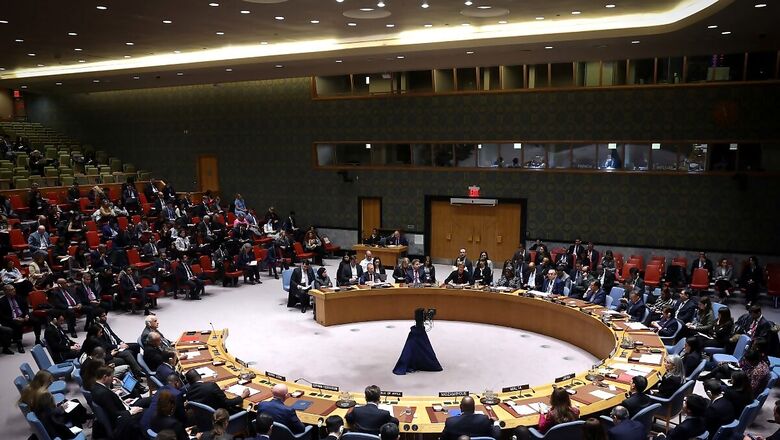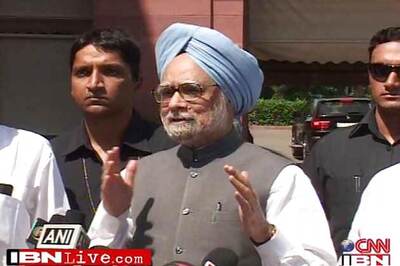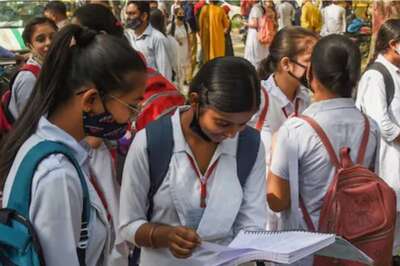
views
The UN Security Council will vote Monday on a new draft resolution on an “immediate” ceasefire in Gaza, after Russia and China vetoed an earlier text proposed by the United States.
The Council has been divided over the Israel-Hamas war since the October 7 attacks, approving only two of eight resolutions, with both dealing mainly with humanitarian aid to the devastated Gaza Strip. Permanent Council member and key Israel backer the United States has unequivocally supported Israel’s right to defend itself following Hamas’s unprecedented attacks.
But with the humanitarian crisis in Gaza deepening, the United States has tempered its support for Israel over its conduct of the war against the Palestinian militant group. The Gaza war began with an unprecedented Hamas attack on October 7 that resulted in about 1,160 deaths in Israel, mostly civilians, according to an AFP tally based on official Israeli figures.
Israel has vowed to destroy the militants, who also seized about 250 hostages, of whom Israel believes around 130 remain in Gaza, including 33 presumed dead. The health ministry in the Hamas-run Gaza Strip on Sunday put the total death toll in the territory at 32,226, most of them women and children. The ministry said 72 people had been killed in early hours of Sunday, including at least 26 killed in air strikes on five homes in the southern city of Rafah.
Last Friday, the Security Council voted on a draft submitted by the United States that called for an “immediate” ceasefire linked to the release of hostages. China and Russia vetoed the resolution, criticizing it for stopping short of explicitly demanding Israel halt its campaign.
UN deliveries to northern Gaza
The new text, according to the version seen by AFP on Sunday, “demands an immediate ceasefire” for the ongoing Muslim holy month of Ramadan, “leading to a permanent sustainable ceasefire.” It also “demands the immediate and unconditional release of all hostages as well as the “lifting of all barriers to the provision of humanitarian assistance at scale.”
The text is being put forward by non-permanent members of the Security Council, which worked with the United States over the weekend to avoid a veto, according to diplomats speaking to AFP on condition of anonymity. “We expect, barring a last-minute twist, that the resolution will be adopted and that the United States will not vote against it,” one diplomat told AFP.
Ahead of taking off for an official visit to Washington, Israel’s Defense Minister Yoav Gallant said his focus would include “preserving the qualitative military edge” and “our ability to obtain platforms and munitions.” He is set to meet Pentagon chief Lloyd Austin and other senior US officials. A key source of tension between Israel and the United States has been the fate of Rafah, where around 1.5 million Palestinians have sought shelter since the start of the war.
US Secretary of State Antony Blinken said a major ground operation in Rafah was not necessary to deal with Hamas, and “there is no place” for civilians there to get out of harm’s way. But Israeli Prime Minister Benjamin Netanyahu, who leads a coalition including religious and ultra-nationalist parties, has vowed to go ahead with a Rafah invasion even without Washington’s support.
In Rafah, a displaced 10-year-old girl lamented the pain of losing her home and the uncertainty she faces. “I have the right to live as a little girl, like anywhere else in the world, in a safe place,” Rama told AFP in the makeshift camp that has become her home. “I used to go to school safely, but now we don’t go to school because of the bombing, and when I go out of our home I am very scared.”
Negotiations aimed at securing a truce in exchange for the release of hostages have meanwhile continued in Qatar, but the heads of the Israeli and US spy agencies involved in the talks have now left the Gulf emirate for consultations, an informed source told AFP. A major sticking point has been Hamas’s position that a temporary truce must lead to a permanent Israeli withdrawal from Gaza, a demand Israel has rejected.
The UN agency for Palestinians said on Sunday that Israel had definitively barred it from making aid deliveries in northern Gaza, where the threat of famine is highest. “Despite the tragedy unfolding under our watch, the Israeli Authorities informed the UN that they will no longer approve any @UNRWA food convoys to the north,” Philippe Lazzarini, the head of the agency, said on X. “This is outrageous & makes it intentional to obstruct lifesaving assistance during a man made famine.” Israel did not immediately respond to AFP’s request for comment about Lazzarini’s statement.
‘Right to live’
Last week a UN-backed food security assessment warned that famine was projected to hit the north of Gaza by May unless there was urgent intervention. Martin Griffiths, head of the UN humanitarian coordination office, said on X on Sunday that UNRWA “is the beating heart of the humanitarian response in Gaza.” He added: “The decision to block its food convoys to the north only pushes thousands closer to famine. It must be revoked.”
On Sunday, UN Secretary-General Antonio Guterres urged an end to the “non-stop nightmare” endured by Gaza’s 2.4 million people in the territory’s worst-ever war. Israel has accused UNRWA staff members of participating in the October 7 attack and called the agency “a front for Hamas.” Touma said Israeli authorities on Sunday also rejected a UN request to send a team to Al-Shifa hospital in northern Gaza, where fighting has flared for almost a week, “to evacuate people who are injured.”



















Comments
0 comment